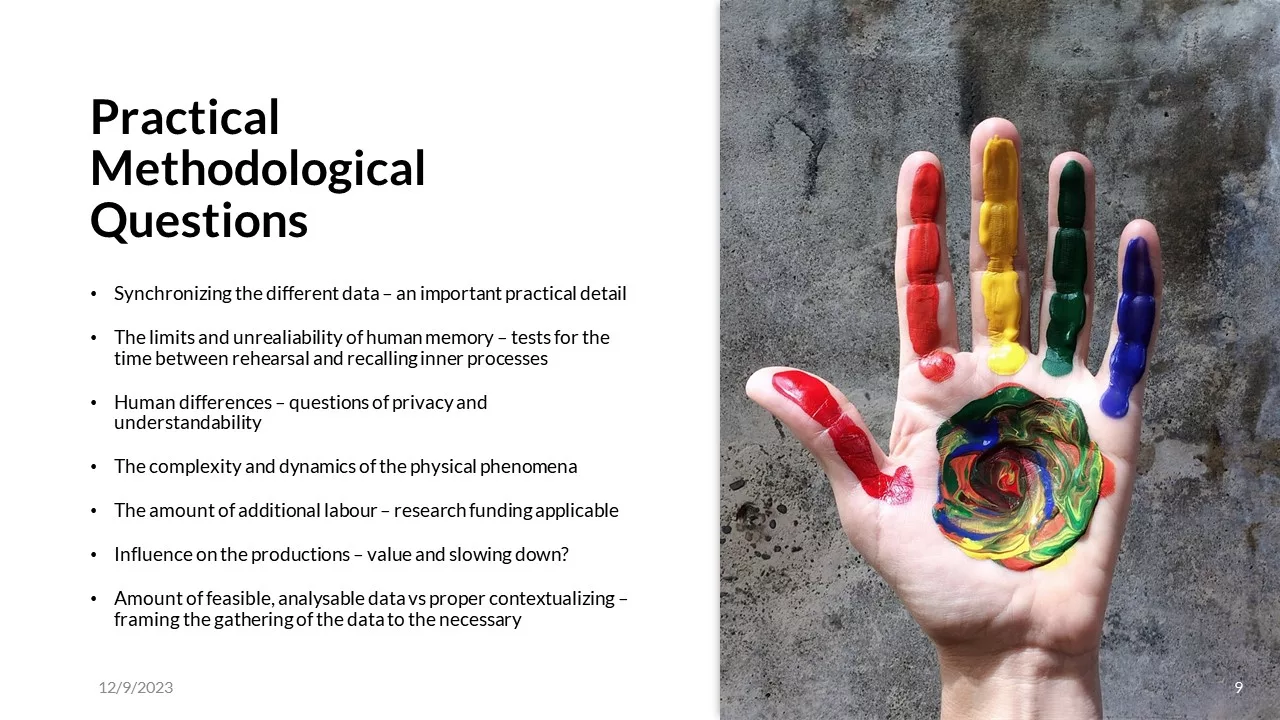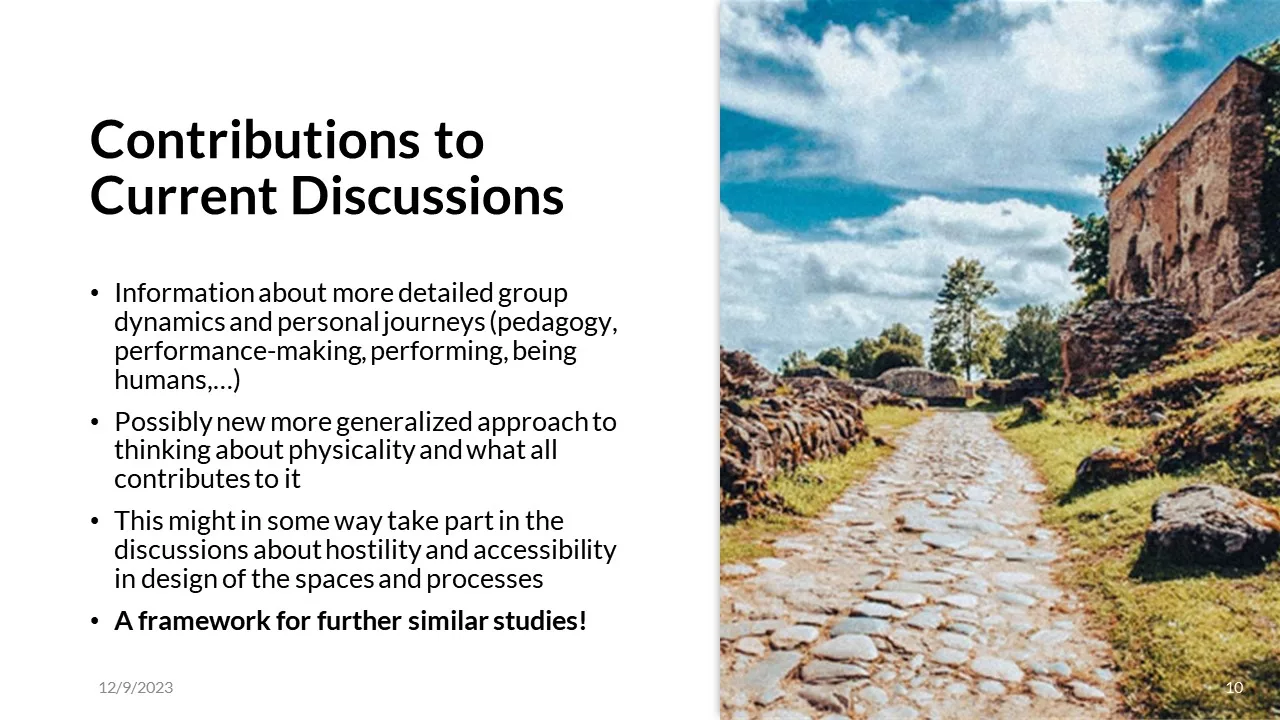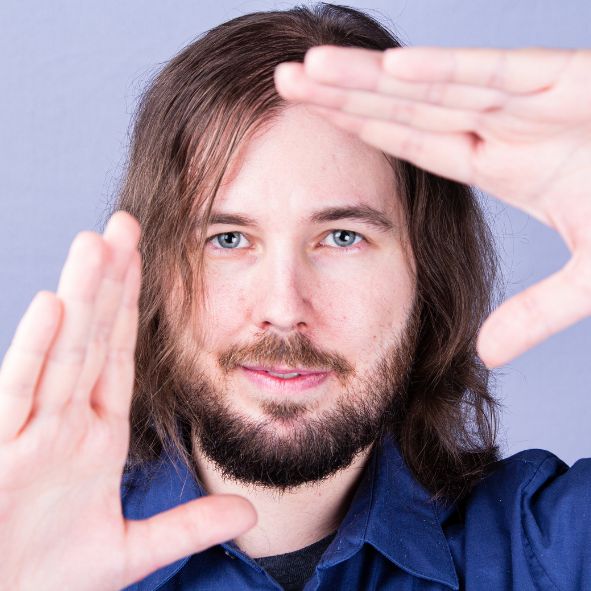Co-research Methodology as seen on December 10th 2023
I will use a co-research methodology as another methodological choice in interplay with Timeline Synchronization. I plan to invite different performing arts groups to participate in the research as co-researchers with their on-going or beginning production.
As these groups share the research responsibilities within their production process, I propose that I try to follow the concept of CRISP consent (“consent in performing arts”) by Intimacy Directors and Coordinators. In this particular research, it would be applied as follows:
- Considered: discussions and analysis must be a part of preparations, and of the whole process
- Reversible: anytime before the project has been published anyone can leave and take their information with them
- Informed: the information about their part of the research should be accessible to everyone all the time
- Specific: plans on how the research (data collection + analysis + exposition) is discussed in detail and followed through.
- Participatory: direction and methods of the research are decided through collaboration and common discussions.
With this methodological choice, there is an extra amount of time and care needed to put to the c onversations and discussions with the co-researchers to keep things C.R.I.S.P.
When looking at the internal processes of the individuals, this kind of idea of consent is the only responsible choice, but it also adds to the labour people must make. I felt like it is also important to compensate for this labour which is why I have budgeted salaries for the working group based on an interpretation of Finnish collective agreement.
Practical Questions
There are still a few practical questions about methods that lie unanswered. Co-research methodology has most to do with the choice of consent that will cause me trouble.
I don’t have much resources at this stage of the research and still I am seeking to do a research about a complicated topic, using the expertise of individuals in a consensual, sustainable fashion. The plan for spring 2024 answers most of these questions: do I get funding, how do the practical details fall together and how do I actually delimit the amount of data that I need to control and record.


Bigger picture of the project
The research I am planning to do is focusing on creating a framework that might help create very interesting many-faceted, multidiscplionary research.
After all, I am researching the complexity of human experience within the physical world.
Using the co-researcher model is the only one, where I can give power and responsibility to enough people, while supporting them in gathering the data needed for the research.
I am not planning on teling academic stories about ’us’ without really including ’us’ in the whole process of story-telling.
Co-research model in practice?
I already described the technical side of the research in the text that describes the idea of Synchronized Timelines as a method. In this text, there is a part that describes the different technological tests, when and how we are testing those in the practice. You can find the table here. In principle, this section will mirror that but from a person’s perspective. This works similarly to a production in how we have a variety of technical choices that we have to test – and only then we know what is actually possible.
The basic idea is still that to help discuss the physicality of a process, I have chosen to use a 360-film to create a common reality. If what happens in the space is synchronized to everyone’s inner experiences, it becomes easier to understand and discuss the experiences in their complexity and in a context.
The current concrete plan of action looks as follows. This might need to be adjusted in the moment and
Weekend # 1: Practical measuring methodology test
-
Two 6-hour workshops to test all the technical equipment in practice (recording and re-experiencing process) including
- 1 h: Discussions and Preparations around the work: final adjustments to the schedule and research plan for the day
- 3 h: Working with the process: record pieces of rehearsal and transfer it into an experiencable format with on-going discussions about insights and observations about the process.
- 1 h: Ending discussions: where the project should be going and what kind of basis we have created for future research.
- Breaks as necessary.
Weekend 2: Building the re-experiencing framework
-
Two 6-hour workshops where we test out the choices we have previously made adding a more concrete way to analyze it
- 1 h: Discussions and Preparations around the work: presenting the schedule and defining the research questions.
- 30 min : Recordings: creating a recording to work with
- 2 h: Re-experiencing tests (the focus of the day): We test different ways to re-experience the recorded rehearsal (see an example of a model of cycles).
- 1 h: Gathering the data together and discussing it with the working group.
- 1 h: Having a discussion around the co-researcher model.
- Breaks as necessary.
Weekend 3: Testing the co-researcher framework in a real-life rehearsal setting
- A two-day-hour workshop where we test the full process
- 2 h: Discussions and Preparations around the work: defining the research questions for this group of co-researchers
- 3 h: Recording the rehearsals: the group works with their production while we record it
- 2 h: Creation of re-experiencing data (through cycles)
- 2 h: Rehearsal continues (while someone analyzes the data)
- 1 h: Gathering the data together and discussing it with the working group.
- Breaks as necessary.
- This weekend might change a lot in format depending on the practical observations made during the previous weekend workshops.
After-the-weekends meetings
- 3-to-5-hour session for the internal data discussion workshop with all the working groups
- 1-2 h: Presenting and Discussing the observations and insights of what we have found out, testing how to present the information
- 1h: Lunch
- 1-2h: Presenting and Discussing the next steps
- 30 minutes public exposition to present the data.
Predicted Practical Challenges
I am predicting at some challenges within the methodology.
As I mention on the technical side, human memory is limited, phenomena are complex and the research will surely slow down the productions we work with. Technology also has it’s issues.
Besides these, I feel like there is a side of using limited resources to work in sustainable way. As an example, there are moral questions I want to address even if I don’t have answers to them yet.
First is about respecting the labour within the field of arts: expertise gathered during the years, labour and time set to this research project and respecting the invisible labour that people have to put forward to participate. This means to me some form of clear compensation to show the value of the labour.
The second is about respecting the human beings: their experiences and their self-expertise. This is naturally a question of using tacit knowledge within academic context: in this research I feel like I want to respect and give time and tools the people need to do the research. If I am given golden nuggets of information, I want to be able to treat them with the respect they deserve. This means effort and care from my part. In my current situation, I feel like this means that I have to find enough compensation for my own work.
After writing these points, I feel like the research I am planning to do this time will need to be restricted to some degree, but plan to continue into a different level of research at a later point with adequate funding and other resources.
